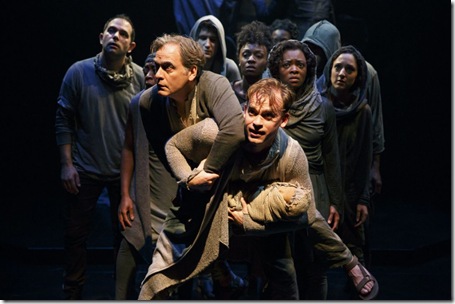Stratford tackles Quebec dramatist’s take on The Aeneid — with mixed results
Photo: David Hou. The Aeneid, adapted by Olivier Kermeid.
STRATFORD, Ont. — It’s the intimate moments that have the most profound impact in The Stratford Festival’s production of Quebec playwright Olivier Kemeid’s The Aeneid .
We’re dealing with the refugee crisis here. So we have this scene where a mother, in anguish over the loss of her own child, spots an infant among her fellow fugitives and picks him up — refusing to relinquish him to his father, Aeneas, the central figure in this ambitious retelling of Virgil’s poem.
A sequence like this defines the terrible reality of the refugee experience. But ultimately it’s the way it moves from the universal to the particular that gives it such tragic intimacy. As the grieving mother, Lanise Antoine Shelley is lacerating in her display of a ravaged soul. But then the intervention of the woman’s husband, portrayed with compelling power by Rodrigo Beilfuss, again pierces the heart: please, he asks Aeneas, allow this poor woman to pretend at least for a time that this is her own child she’s holding.
There’s an honest naturalism here — and that often doesn’t happen in a production as infatuated with stylization as this one. But when these moments are allowed to happen, they come through with searing immediacy.
For example, there’s a moment of cruel irony in the scene where a carefree couple, neatly played by Mike Nadajewski and Lanise Antoine Shelly, are sunbathing on the beach, in the gated artificiality of some Mediterranean or Aegean resort, only to have their blissful world disturbed by the appearance of a distraught refugee who has presumably been washed up on shore. Their only response is to flee and put this inconvenient apparition out of sight and out of mind — a response similar, the play seems to suggest, to the attitudes of many in the western world to the refugee problem.
A play like this can easily veer into shallow polemic, but Kemeid’s keen-edged dramatic instincts don’t desert him. There comes a moment when Michael Spencer-Davis, excellent as the shade of Aeneas’s aging father, delivers an impassioned speech on behalf of the refugees of the world. Paradoxically, it’s the eerie unreality of these moments, which see us shifted seamlessly into some sort of dreamscape of the dead, that glistens with a real-life immediacy.
Maureen Labonte’s fluid English translation of Kemeid’s often fascinating play was commissioned by the Stratford Festival. Its topicality is obvious — given the thousands of Syrian refugees who have arrived in Canada in recent months. But one wonders about saddling it with a title that so specifically identifies it with Virgil’s 2000-year-old poem about the aftermath of the Trojan war and the search by Aeneas and his followers for a new home.
Playgoers need to know that this play is a very loose adaptation and that Olivier Kemeid is very much concerned with the here and now. The play was nominated for a Governor General’s award and been translated into four languages. Keira Loughran’s production for Stratford is attentive to the script’s dramatic strengths, but less secure when dealing with its structural volatility.
Yet, there is much to praise. This is a large-scale production that achieves a seething reality in the intimacy of the Studio Theatre. The opening moments are like a sudden eruption — a frenzied disco gathering is suddenly disturbed by the arrival of a frantic modern-day oracle (Mike Nadajewski in prophet-of-doom mode) warning that death and destruction are on their way. But the revelry continues until all hell breaks loose.
The production offers any number of set-piece dramatic moments that engage our attention — and, depending on the circumstances, our compassion or our anger. One particularly telling scene depicts the confrontation between a desperate asylum-seeker, portrayed with wrenching persuasiveness by Lanise Antoine Shelley, and a frosty immigration official, depicted with infuriating by-the-book smugness by Karen Robinson who here is delivering one of her three stand-out characterizations in this production.
But notwithstanding some dazzling ensemble work, this is a production that seems a little too pleased with itself. We’re supposed to be seeing human beings at the end of their tether — victims of a blood-soaked, disintegrating, soul-shrivelling catastrophe — yet so much seems too carefully framed and organized. The need for a striking image smothers the emotional heartbeat. We have picturesque group formations worthy of a Busby Berkeley sequence. We have designer Joanna Yu’s careful colour coding in the costumes and her ever-changing sculptured hulk of a set that seems a smidgeon too calculated.
In brief, if this production was seeking a medal for good grooming it would probably win. Aesthetically, this sensibility seems bizarre — it’s almost as though it’s striving to keep the true messy horror of the refugee experience at a distance. One feels for Gareth Potter, a good actor, who plays Aeneas. His is a performance of emotional intensity and integrity — yet, need he look so well-scrubbed? Couldn’t he even look a little unkempt? Need he look as though he’s just emerged from a hair salon at every moment in his grim odyssey? In some ways, Aeneas is reduced to the same level of unbelievability as the patently bogus infant child that he carries around for much of the evening.
(The Aeneid continues to Sept. 25. Ticket information at 1 800 567 1600 or stratfordfestival.ca)
